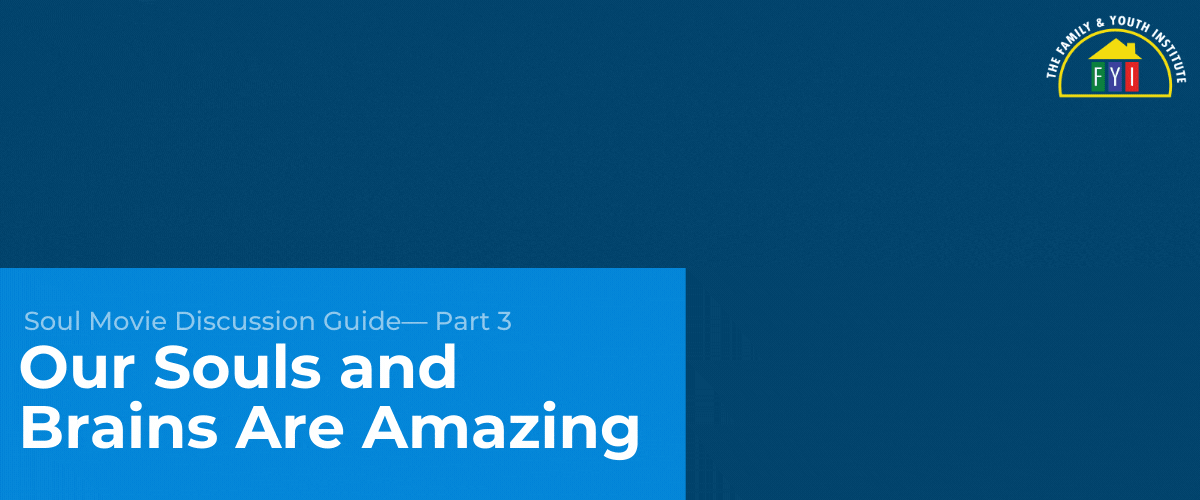
This article was authored by Duaa Haggag, LPC
In Part 1 and part 2 of the Soul Movie Guide Series, we discussed how the movie provides insight and discussion points on knowledge about death and afterlife, the purpose of life, and finding meaning in every moment. In Part 3, we will be discussing how amazing our brains and souls are, and providing support to those souls who need it. Please note that the topics and themes in the movie may not be suitable for children younger than 11, and so this article is not intended for discussions with younger children.
Theme 3: Our Brains Are Amazing. Our Souls Are Amazing.
Say: ‘The soul is the affair of my Lord. And mankind has not been given of knowledge except a little. (17:85)
The movie Soul presents many ways to think about the human soul, such as “Untethered Souls” or “Lost Souls.” We can compare these depictions to what Islam teaches us as well as recent neuropsychological research. As always, we must remember that there is much we don’t know, the knowledge of which remains with Allah (SWT).
“Untethered Souls” or Focused Mindfulness. The movie shows the concept of “untethered souls,” or those who are so immersed in art, meditation, or any action that would lift a soul outside of the current realm. While we understand that the ultimate knowledge of our souls rests with Allah (SWT), this is not a far-fetched idea. We know that the companions were in such a state of khushoo’ (deep focus) while they were in salah (prayer) that they were in a completely different state of mind. The Prophet (PBUH) would often remind us to practice focused mindfulness, particularly as it relates to feeding our souls with contemplation and prayer.
Mindfulness and being “untethered” as described in Soul helps us realize how amazing our brains can be! In current research, neuroscientists are finding evidence to show that our brains are certainly capable of escaping certain aspects of our life experiences; it could be out of fear, or as a means of processing whatever life experiences come our way. The Creator magnificently created our brains in a way to automatically allow this to happen, both as a survival mechanism and a way to increase the quality of our life.
We also know from our Islamic tradition that when we sleep, our souls leave our bodies to go to another realm. They may even meet other souls who have passed in this world. During this same time, our brains do the very important work of regulating all the body’s systems. This understanding helps us center ourselves before bed with supplication and conscious remembrance of Allah.
“Untethered Souls” or Focused Mindfulness. The movie shows the concept of “untethered souls,” or those who are so immersed in art, meditation, or any action that would lift a soul outside of the current realm. While we understand that the ultimate knowledge of our souls rests with Allah (SWT), this is not a far-fetched idea. We know that the companions were in such a state of khushoo’ (deep focus) while they were in salah (prayer) that they were in a completely different state of mind. The Prophet (PBUH) would often remind us to practice focused mindfulness, particularly as it relates to feeding our souls with contemplation and prayer.
Mindfulness and being “untethered” as described in Soul helps us realize how amazing our brains can be! In current research, neuroscientists are finding evidence to show that our brains are certainly capable of escaping certain aspects of our life experiences; it could be out of fear, or as a means of processing whatever life experiences come our way. The Creator magnificently created our brains in a way to automatically allow this to happen, both as a survival mechanism and a way to increase the quality of our life.
We also know from our Islamic tradition that when we sleep, our souls leave our bodies to go to another realm. They may even meet other souls who have passed in this world. During this same time, our brains do the very important work of regulating all the body’s systems. This understanding helps us center ourselves before bed with supplication and conscious remembrance of Allah.
Discussion Questions
- • Do you ever feel so immersed in something that you’re not present with the people or places around you? Was it a good book or the companionship of a friend?
- • What steps do you take to get in a state of khushoo’ (deep focus) while in prayer, a state where you feel truly disconnected from this dunya (world)?
- • Discuss mindfulness with your child. Refer to this article about discussing this topic with teens/tweens.
- • What are other ways that you can engage in mindfulness?
Be Aware that Souls can get lost. One of the most clever depictions in the movie are “Lost Souls,” those who get stuck in the Soul Realm while their earthly bodies struggle with an obsession. They represent individuals who become so engrossed in a job, passion, or idea that they cannot be fully present in life’s experience. It is not necessarily the passion that is negative, but the obsession of it taking over that lowers the quality of life. As soul- guide Moonwind, says “When that joy becomes an obsession, one becomes disconnected from life.”
From a spiritual angle, Ibn Al-Qayyim discusses this notion on purification of the heart. We sometimes go through the motions of this dunya or get so caught up in our pursuits (careers, passions, accolades) without renewing our intentions and feeding our souls with remembrance, mindfulness, and contemplation. In doing so, our hearts may become hardened. Being too caught up in these worldly distractions then makes it difficult for us to be fully present or in touch with our fitrah (natural disposition or instinct).
A term often used in the Qur’an to describe a heart that neglects mindfulness is ghafla, or as a state of heedlessness or mindless roaming (just like they show Lost Souls in the movie!). Even when we engage excessively in life’s permissible pleasures, such as eating, sleeping, spending, or conversing, we weaken the heart’s ability to be clear in its connectedness to its Creator. This is why our Islamic tradition calls for the “middle” path.We are even given an entire month (Ramadan) to subdue our desires and train our souls to crave a different kind of sustenance.
From a mental health angle, the Lost Soul provides imagery for the disconnected feeling that many who struggle with mental illness experience. They may not necessarily be chasing an obsession but they feel disconnected at various times during their illness. The movie even hints at how to help with this disconnected feeling when Joe rescues one of these Lost Souls. He plays his music to help it break free of its trance and return to its body. Although we know that anyone suffering from mental illness is not a Lost Soul, they are certainly individuals who may be struggling with issues that take up all of their energy and focus. They need our support to help them slowly come out of the realm they find themselves in, just as Joe rescued the Lost Soul in the movie
From a spiritual angle, Ibn Al-Qayyim discusses this notion on purification of the heart. We sometimes go through the motions of this dunya or get so caught up in our pursuits (careers, passions, accolades) without renewing our intentions and feeding our souls with remembrance, mindfulness, and contemplation. In doing so, our hearts may become hardened. Being too caught up in these worldly distractions then makes it difficult for us to be fully present or in touch with our fitrah (natural disposition or instinct).
A term often used in the Qur’an to describe a heart that neglects mindfulness is ghafla, or as a state of heedlessness or mindless roaming (just like they show Lost Souls in the movie!). Even when we engage excessively in life’s permissible pleasures, such as eating, sleeping, spending, or conversing, we weaken the heart’s ability to be clear in its connectedness to its Creator. This is why our Islamic tradition calls for the “middle” path.We are even given an entire month (Ramadan) to subdue our desires and train our souls to crave a different kind of sustenance.
From a mental health angle, the Lost Soul provides imagery for the disconnected feeling that many who struggle with mental illness experience. They may not necessarily be chasing an obsession but they feel disconnected at various times during their illness. The movie even hints at how to help with this disconnected feeling when Joe rescues one of these Lost Souls. He plays his music to help it break free of its trance and return to its body. Although we know that anyone suffering from mental illness is not a Lost Soul, they are certainly individuals who may be struggling with issues that take up all of their energy and focus. They need our support to help them slowly come out of the realm they find themselves in, just as Joe rescued the Lost Soul in the movie
Questions to consider:
- • What steps do you take as a family to live a life of moderation?
- • How can something like spending too much time chatting, whether in person or online, affect your soul?
- • What kind of healthy pauses do we have in our lifestyle or daily routine that allow for contemplation, mindfulness, and spiritual remembrance?
- • Do you know someone who may fall in the “Lost Soul” category?
- • How can we be a helping force in supporting them in their struggles?
Soul Movie Discussion Guide— Part 3: Our Souls and Brains Are Amazing
Related
Tagged on: export
